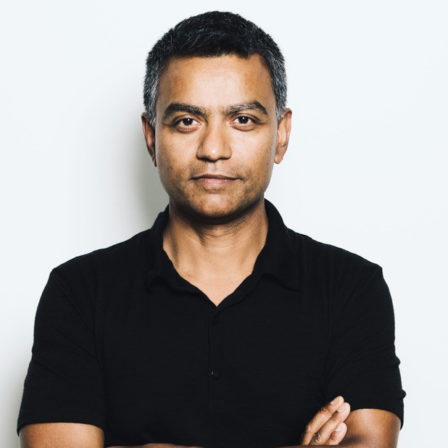Friday, October 18, 2024
Deb Roy: Social Dialogue Networks
- Hybrid
- Seminar

The DEL Seminar Series is proud to host a diverse roster of bright minds from around the world to discuss various subjects surrounding economics and technology.
On October 28, 2024, Nick Economides of the Stern School of Business of New York University joned us for his talk, “Interoperability, Antitrust Remedy or Regulatory Rule.”
Abstract
Imagine a world where authentic conversation about society’s most important issues is not just possible, but normal. Unfortunately, our public sphere is broken. Social media rewards and amplifies the loudest voices. Much of civic discourse devolves into a spectacle of viral confrontations and one-sided diatribes, leaving no room for nuance and authenticity. These communication patterns themselves have gone viral, spreading from online to in-person settings. Town halls, college campuses, and workplaces now struggle with community-wide conversations often overwhelmed by the most extreme opinions.
In 2016 our research team now at the MIT Center for Constructive Communication began experimenting with an idea: could we combine ancient wisdoms of human dialogue and community building with AI and other digital technologies to foster human connection and trust? Cortico, a non-profit closely affiliated with MIT, was established to translate our research concepts and prototypes into scalable deployments.
In our approach, small group facilitated conversations are combined with consent-based recording and consent-based sharing of highlights from those conversations. AI-powered tools assist in making sense of patterns across conversations. Cities are adopting our approach to engage residents more effectively than through traditional public meetings. We’ve also found this approach effective in amplifying the voices of young people. At MIT, we’re developing a program on tech-enhanced dialogue, listening, and deliberation to put MIT on a path to becoming a “listening campus.”
But does it scale? We believe it can, by combining powerful AI-based tools, well-designed social network apps, and with a commitment to supporting broad participation, which in turn depends on people building “civic muscle” – skills in dialogue, conversation analysis, and deliberation.
In this talk I will introduce our approach, show examples of its implementation and use, and sketch research opportunities ahead.
For background on the approach, see this essay in the Atlantic
Deb Roy
Professor, MIT
Deb Roy is professor of Media Arts and Sciences at MIT where he directs the MIT Center for Constructive Communication (CCC). He leads research in designing human-AI systems that foster dialogue, listening, and deliberation in ways that build civic muscle. Roy is also co-founder and unpaid CEO of Cortico, a closely affiliated nonprofit collaborator of CCC that develops, operates and supports a conversation platform designed to surface underheard voices and perspectives and create scalable dialogue networks.
Previously, Roy was a visiting professor at Harvard Law School (2021-22), and served as executive director of the MIT Media Lab (2019-2021), where CCC is based. Earlier, while on leave from MIT, Roy co-founded and was CEO of Bluefin Labs, a media analytics company that analyzed the interactions between television and social media at scale. Bluefin was acquired by Twitter in 2013, Twitter’s largest acquisition to date. From 2013-2017 Roy served as Twitter’s chief media scientist.
Currently Roy serves on the board of the Knight First Amendment Institute and the FRONTLINE advisory council. He previously served on the Knight Commission on Trust, Media, and Democracy and the Aspen Institute’s Commission on Information Disorder.